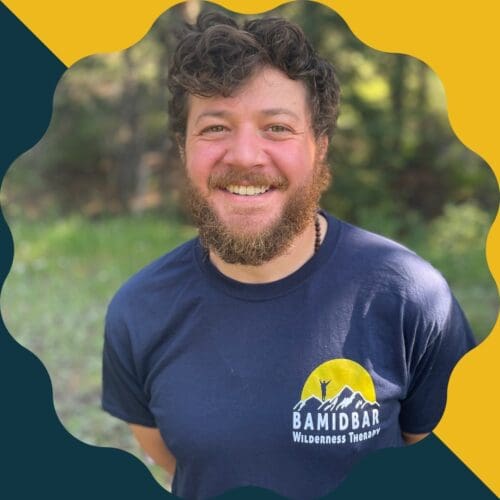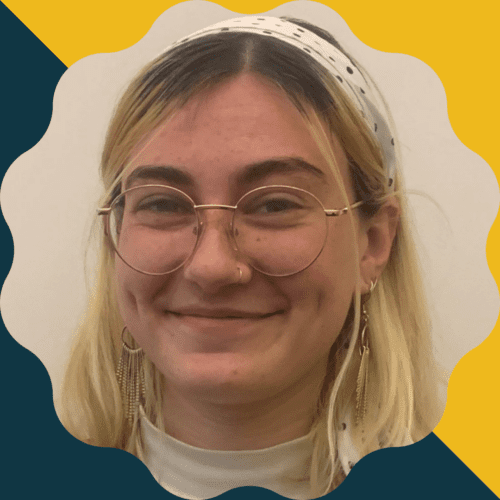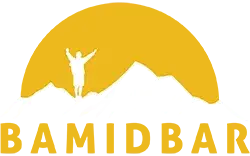by Adam Karp & Rachel Anszelowicz
Wise, wicked, simple, or silent? As a child, every year at Passover, we recall wondering, “Which one am I?” and “How do others see me?” As an adult, we understand that the framework of the Four Children during the Passover Seder can actually provide a powerful statement on the responsibility of adults to respond to each child by meeting them where they are. The value of this framing lies in the opportunity to support and connect with each child, not standing in judgment of each child.
At a time when youth mental health needs are on the rise, further evidenced by this recent announcement from the Center for Disease Control, meeting each child where they are is no longer just a best practice; it is imperative.
That’s why BaMidbar partnered with Foundation for Jewish Camp to launch the third cohort of the Jewish Camp Mental Health and Wellness Internship this spring. At the end of last summer, Jeremy Fingerman, CEO of Foundation for Jewish Camp, reflected in eJewishPhilanthropy that “camps had to navigate through enormous Mental, Emotional, Social, and Spiritual Health (MESSH) challenges.” As camps look forward to summer 2022, we know mental health continues to be a critical concern. Through the virtual internship, seasonal camp counselors learned about the challenges facing their campers and peers today and developed skills to better support a culture of mental health and wellness at Jewish camps.
The internship has been lively, illustrating how this innovative program is addressing the need for increased conversations around mental health and wellness at summer camps. Summer camp staff across North America are hungry for skills to effectively and appropriately discuss mental health and wellness with their campers and peers, and to do so through a Jewish lens.
During one of the sessions, interns defined stigma as “a mark of disgrace put upon a person.” Delving deeper into the role that stigmas can play at camp, they learned about the seven types of stigma surrounding mental illness (NAMI, 2018). Exploring potential camp scenarios, interns learned to:
- Understand what type of stigma was present in the scenario;
- Identify the danger and negative impact that stigma posed; and
- Create an action plan to support all campers and staff involved.
One of the group’s most valuable conversations came after discussing an example pulled from one of the facilitator’s experiences as a camp counselor. There are two campers who are typically inseparable. One made an insensitive joke about schizophrenia, and the other revealed that his brother actually has that mental illness. They did not speak to each other for almost a week after that conversation.
That is a clear example of “Stigma by Association.” The second camper didn’t have a mental illness, but his relationship to someone who does caused him to feel alienated at camp. The interns grappled with a few key questions. Most importantly, why did two good friends stop talking to each other? How can we use this moment to promote healing and understanding? As the conversation progressed, many of the interns shared that they had faced similar challenges in their own time as camp staff.
Stigma, like mental illness, is complicated. There is not always a victim/perpetrator dynamic. In this situation, one camper was being insensitive. But it’s important to understand where the statement came from. Many of our campers and staff come from environments where diagnoses are flippantly thrown around. Comments like , “I’m so ADHD right now ” or “My laptop is bipolar” can become commonplace. We forget these words have determinate meanings, especially to those people who have direct experience with these diagnoses.
The story of Passover, the Jewish holiday commemorating the exodus from Egypt, is a helpful framework for us to explore the distance created between these two campers. During the seder (the ritual Passover meal), the fable of Four Children provides a powerful image of the child who does not know how to ask. When it comes to mental illnesses, we are often that child. We don’t know how to make amends or how to show our curiosity without overstepping boundaries. When we learn a friend is experiencing a physical illness, we can imagine life in their shoes. With mental illness, we often don’t know where to start – so we either ignore it, avoid engaging with it, make assumptions about it, or make light of it. To the people living with the mental illness first hand, these approaches are rarely helpful.
In the discussion about this scenario with the Jewish camp interns, the group had to be mindful of the meaningful ways that jokes about mental illness cause harm. But shame should also be considered. The interns noted that the second camper likely feels embarrassed by his friend’s joke. They pointed out that the first camper is also likely experiencing shame he isn’t sure how to address after his misguided joke was met with pain instead of laughter. It’s a lesson in positive intention. We don’t know where the first camper’s ideas about mental illness came from. But we do know that the two campers were friends just a few days ago and that now, their friendship is in jeopardy. The camper who made the joke is the child who doesn’t know how to ask.
While it’s difficult for camp staff to teach campers everything about mental illness and combating stigma in a single summer, teaching a camper to ask thoughtful questions, make amends, and reconnect is part of what makes camp the special place that creates opportunities for learning, growth, and lifelong friendships.
One important outcome of the internship program is camp counselors who are better prepared to understand how to listen and respond to those questions, making their respective camps safer spaces for exploring and questioning the world around them, their relationships and themselves. The Jewish Camp Mental Health and Wellness interns will return to camp this summer with resources they developed at the conclusion of the program, to help incorporate wellness into different aspects of camp life and the skills to support Jewish youth and their peers on their journeys toward growth. They will know they are not alone.
Still, the journey to building more supportive and understanding camp communities is far from over. Buy-in from year-round camp leadership and mental health professionals are also essential tools for building and maintaining this growth. At the conclusion of the program about three-quarters of the interns indicated that they are now more seriously considering working in camp or mental health professionally as a result of this program . One intern noted that their biggest takeaway from the program was “not to be afraid to face mental health challenges within myself, campers, or others.”
During the most recent Passover Seders, you may have identified yourself with just one of the Four Children. As you reflect, we invite you to explore how you can relate to each one. Doing so brings us one step closer to a community that provides a safe space to have conversations that promote healing, mutual understanding, and growth, as we continue our journeys into unfamiliar terrain.
This internship was powered by the Yedid Nefesh initiative, made possible through the Marcus Foundation. Interns created resources available to educators, counselors, and camp leadership – stay tuned for the third cohort’s projects, and catch previous interns’ resources here.
About the Authors

[Image Description] Headshot of Adam Karp
Adam Karp is BaMidbar’s Wellness Programs Manager and co-facilitated this Jewish Camp Mental Health & Wellness Internship. Adam graduated from Antioch University with a Masters in Clinical Mental Health Counseling in Spring 2021. Prior to pursuing his master’s degree, Adam worked in the fields of wilderness therapy and Jewish experiential education. He would not be where he is without his time spent at URJ Camp Eisner (3 summers), Camp Yavneh (12 summers), BBYO’s Impact Boston (2 summers) and Brandeis University’s Genesis (2 summers). He loves exploring the ways in which our hearts and minds align with Jewish history and philosophy. Most recently, that has involved working as a Field Therapist for BaMidbar, and, in a partnership with Combined Jewish Philanthropies, a facilitator for the Jewish Teen Initiative’s Peer Wellness Cohort.

[Image Description] Headshot of Rachel Anszelowicz
Rachel Anszelowicz helped lead the Mental Health and Wellness internship as an FJC Fellow focusing on MESSH (mental, emotional, social, and spiritual health) and Diversity, Equity, and Inclusion. Rachel graduated from Binghamton University in 2020 with degrees in Philosophy, Political Science and Judaic Studies. She attended Camp Laurelwood for five summers as a camper and has spent the last 10 summers at New Jersey Y Camps, where she also works as the Assistant Director of NJY Teen Camp. In addition to camp, some of Rachel’s favorite things include ice skating, her sewing machine, matzah ball soup and her pet rabbit, Jasper.

